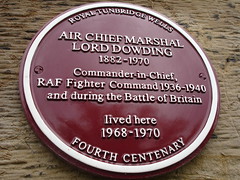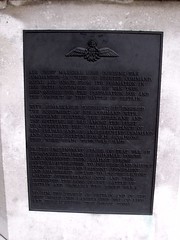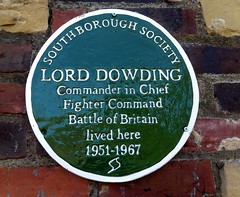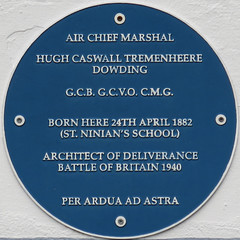Sir Air Chief Marshal Lord Hugh Dowding CMG GCVO GCB


Sir Air Chief Marshal Lord Hugh Dowding CMG GCVO GCB
(1882-1970)
Commemorated on 6 plaques
Lord Hugh Dowding Air Chief Marshal 1882-1970 Leader of Fighter Command lived here 1941-1951
3 St Mary's Road, Wimbledon, SW19 Merton, London, United Kingdom where they lived
Air Chief Marshal Lord Dowding 1882-1970 Commander-in-Chief RAF Fighter Command 1936-1940 and during the Battle of Britain lived here 1968-1970
1 Calverley Park, Tunbridge Wells, United Kingdom where they lived
Air Chief Marshall Lord Dowding was Commander-in-Chief of Fighter Command, Royal Air Force from its formation in 1936 until November 1940. He was thus responsible for the preparation for and the conduct of the Battle of Britain. With remarkable foresight he ensured the equipment of his command with monoplane fighters, the Hurricane and the Spitfire. He was among the first to appreciate the vital importance of R.D.F (Radar) and of an effective command and control system for his squadrons. They were ready when war came. In the preliminary stages of that war, he thoroughly trained his minimal forces and conserved them against strong political pressures to disperse an misuse them. His wise and prudent judgement and leadership helped to ensure victory against overwhelming odds and thus prevented the loss of the Battle of Britain and probably the whole war. To him the people of Britain and of the free world owe largely the way of life and liberties they enjoy today.
Statue of Hugh Dowding - St Clement Danes - Strand, London, United Kingdom where they is commemorated
Lord Dowding Commander in Chief, Fighter Command, Battle of Britain lived here 1952-1968
5 Darnley Drive, Southborough, United Kingdom where they lived (1952-1970)
Air Chief Marshall Hugh Caswall Tremenheere Dowding G.C.B. G.C.V.O. C.M.G. Born here 24th April 1882 (St. Ninian's School) Architect of deliverance Battle of Britain 1940 Per Ardua Ad Astra
Old Well Road, Moffat, United Kingdom where they was born (1882)
Air Chief Marshall Lord Dowding 1882-1970 Leader of Fighter Command lived in a house on this site 1941-1951
3 St Mary's Road, Wimbledon, SW19 Merton, London, United Kingdom where they lived (1941-1951)






